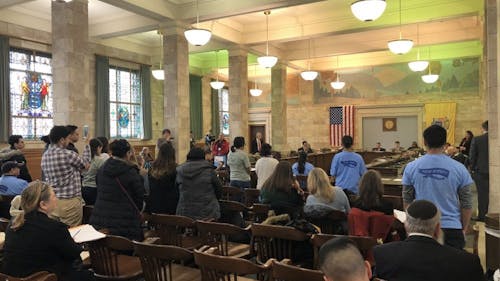NJ senators vote in favor of bill that provides financial aid to eligible DACA students

Last week, the New Jersey Senate Budget and Appropriations Committee voted in favor of Bill S699, legislation that would grant certain undocumented students eligibility to apply for state financial aid.
The vote ended with eight state senators in favor, three who voted no and two that abstained. The bill will now head for a third reading before the state Senate floor on March 26. The bill could cover approximately 600 undocumented students in the state, according to the Legislative Fiscal Estimate.
The financial aid benefits being decided upon are those distributed through the Higher Education Student Assistance Authority (HESAA) or the Secretary of Higher Education, according to an updated statement on the bill.
The Tuition Aid Grant (TAG) — distributed through HESAA — will appropriate $425.9 million in the state budget to help students pay for college. An additional $4.47 million is estimated to go toward helping undocumented students with college costs if the bill is signed into law, according to the fiscal estimate.
During the bill hearing, Frank Argote-Freyre, an assistant professor at Kean University, testified in favor of bill S699. In his testimony, Argote-Freyre discussed University President Robert L. Barchi’s support of the undocumented community at Rutgers and how there are undocumented student populations at both schools.
“They are often forced to study one semester and to take the next semester off so they can afford the tuition,” Argote-Freyre said.
State Sen. Declan O’Scanlon Jr. (R-N.J. 13th) said he abstained from the roll call because of the ambiguity in the long-term costs of the bill and who exactly it would cover.
In response to O’Scanlon’s question, State Sen. Teresa Ruiz (D-N.J. 29th) said that according to the fiscal estimate by the Office of Legislative Services — a bipartisan department that does research for bills — S699 would not cover all undocumented students in the state. Rather, it would be for students that qualify under requirements laid out in the bill description.
Some requirements include having a New Jersey high school diploma, attending a high school in the state for more than three years and being a current college student not enrolled earlier than the 2013-14 fall semester, according the bill's statement. If a student does not have lawful immigration status, the bill would require said student to file an affidavit with their school stating they have filed or will file an application to legalize their status.
O’Scanlon said he would need more details on the exact funding needed to fuel S699 and would be open for more discussion in the lead up to the next vote.
The issue of return on investment comes up with this bill and the students it impacts. Ruiz said the state should be thinking about its return when it sends undocumented students through the public school system and cuts off an avenue for more return through a college education.
“We should be thinking about return on investment when we pass policy,” she said.
There are more than 17,000 New Jersey residents that are Deferred Action for Childhood Arrivals (DACA) recipients, according to United States Citizenship and Immigration Services.
The bill’s effort is not the first time New Jersey has tried to grant undocumented students the same benefits given to other financial aid recipients through the TAG program. In 2013, the “Tuition Equality Act” was a measure that tried to equal the playing field for undocumented students.
To conclude the testimonies, a 21-year-old DACA recipient, Sara Mora, testified on her personal story dealing with the administrative program being rescinded and its effect on scholarships she received while at Seton Hall University.
She said she received calls from school financial-aid officials that informed her the scholarships that once helped her afford college were no longer available due to her status. If S699 is signed into law, Mora said it would present her with the opportunity to finish her bachelor’s degree and attend law school.
Ruiz thanked the students who testified in favor of the bill.
“We can’t wait for the (federal government) to protect New Jersey students, we have to do that here today,” Ruiz said.



